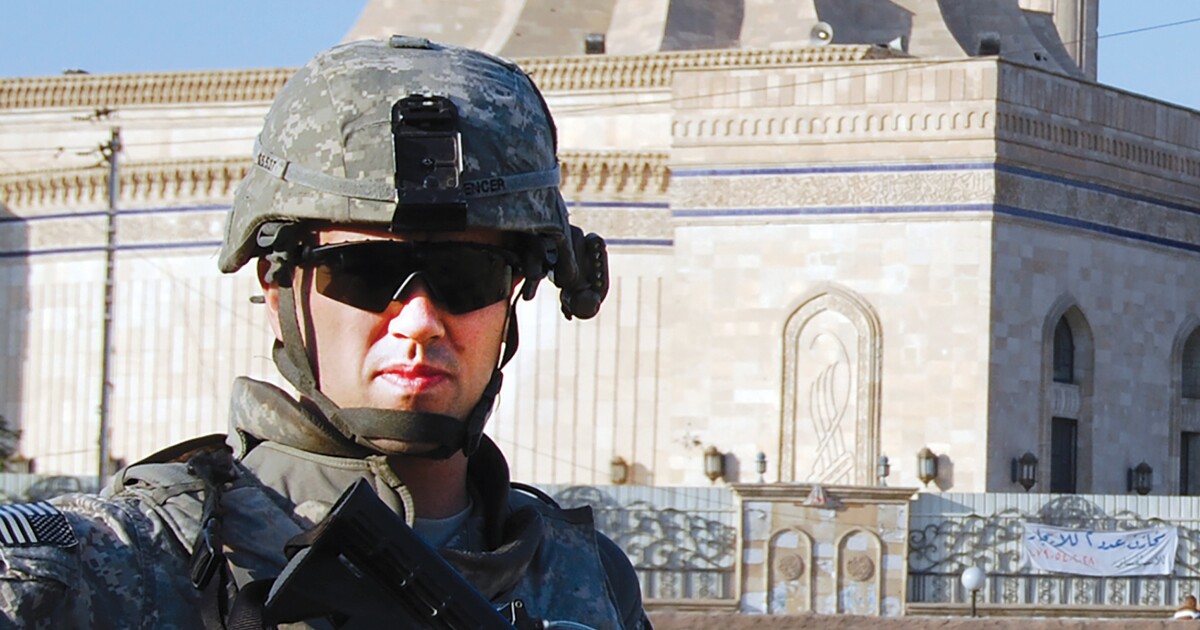

In his 25 years in the Army, John Spencer rose from the rank of private to major, did two combat tours in Iraq, and served as an instructor for the elite Army Rangers. Upon retirement, he transitioned to what he calls his “dream job,” traveling the world studying classic urban battles as chairman of urban warfare studies at the Madison Policy Forum. Spencer is now an internationally recognized expert who regularly consults for the Army. Spencer helped create the Modern War Institute at the U.S. Military Academy and served for a time as its deputy director. He shared his insights on the state of play in Ukraine with the Washington Examiner magazine’s Jamie McIntyre.
[The following interview has been edited for length and clarity.]
Washington Examiner: You returned recently from Kyiv. What are your impressions of how the war is going?
Spencer: I went there to study the battle of Kyiv, which is, in my opinion, the most decisive, strategic victory of the modern era. I mean, this small country with a small army that wanted to fight for their freedom stood up against the second-biggest military in the world and defeated them in the battle of Kyiv.
Washington Examiner: What has most surprised you about what has transpired in Ukraine?
Spencer: The biggest surprise is really the will of the Ukrainian military and people. I’ve personally never studied a war where tens of thousands of civilians were handed AK-47s and actually fought. Everybody says [the Ukrainians] have a culture of resistance. But I was amazed at stories of father-son teams, grandpas, grandmas calling in airstrikes, of the Ukrainian people’s resistance to Russian occupation.
Washington Examiner: It’s been roughly three months since the Russians suffered their failed attempt to seize Kyiv. The battleground has now largely moved to the eastern Donbas region, where Russia has mercilessly leveled towns with numerically superior artillery fire.
Spencer: Yes. By early April, the Russians gave up on Kyiv, Kharkiv, and most of the major cities and basically directed all their 100,000 plus forces, who were already mauled, with many of the best units destroyed, and focused them on the east and said, “OK, I just want you to take the Donbas so I can call it a political victory.”
And the Ukrainians have really struggled, to be honest, to keep the Russians from doing that because they’re outmanned, outgunned, and because the Russians are willing to sacrifice thousands of soldiers to make minor tactical gains.
Still, the Ukrainians have made some amazing stands in places like Severodonetsk, where it took the Russians six weeks to really take a very small Ukrainian force and the Russians sacrificed around 5,000 soldiers to do it.
Washington Examiner: You first came to my attention when I saw you publicly offering advice to the Ukrainians on how to conduct defensive urban warfare. Did they follow your advice?
Spencer: Yeah, absolutely. I started tweeting at the minute I saw Russia invade because Russia was headed to the cities. The president had instituted martial law, which said that basically any male from 18 to 60 couldn’t leave the country. Civilians were being asked to help defend the country.
Maybe Russia thought that they wouldn’t, but they did. So I started putting out advice because I’ve studied urban warfare and this, clearly, was going to be an urban fight. Those messages turned into a book called The Mini-Manual for the Urban Defender, with very commonsense advice on how to use the urban terrain and the defense to achieve great success.
Washington Examiner: How have the Ukrainians employed the rules of urban warfare to frustrate the Russians?
Spencer: Take Severodonetsk. The Russians put artillery in front of them, but eventually, they had to get in there and take out any resistance. And that’s where the rules of urban warfare and the Mini-Manual come in. What the Ukrainians are doing is fighting smarter, right? They’re not going to say, “I’m going to defend to the death, this urban terrain.” Instead, they’re saying, “I’m going to defend it for a while. And if you want it, come forward, and I’m going to attrit you. I’m going kill as many Russians as possible and destroy as much Russian equipment.” If you’re going to defend urban terrain, it’s a very effective defense, and I think it’s a great strategy and it’s working.
Washington Examiner: The Pentagon announced this month another $400 million package of arms and ammunition, including four more High Mobility Artillery Rocket Systems, or HIMARS, the deadly accurate multiple-launch system that can hit a target 40 miles away with GPS precision. How important is that?
Spencer: In deference to the massive amounts of fires that the Russians have, they don’t really care about accuracy, right? When they’re trying to hit a weapons depot or a fuel station, they don’t care if they hit a kindergarten instead.
These precision, long-range, guided munitions are taking out Russian control points, Russian forces, because even if the Ukrainians have to retake land, they’re not going to destroy it like Russians would. They’re going to be precise. But we only gave them four of these systems. That’s pretty crazy if you think about war. I’m going to give you four pieces of equipment.
Washington Examiner: The United States did add four more and then another four, bringing the total to an even dozen, but I’m not sure as we talk if they’re there yet.
Spencer: They’re not there yet. They need 50. They need 60 to even match, in any sense of the word, what they’re facing with Russia in front of their faces. Clearly, they’re fighting smarter. It’s been amazing. The U.S. has been the biggest [contributor] with, I don’t know, $30 billion, whatever it is. But nobody has given them even half of what they need for Russia to be defeated in Ukraine.
Washington Examiner: President Volodymyr Zelensky has never missed a chance to say how grateful he is for the steady flow of weapons and ammunition from the West, in particular from the U.S., but at the same time, he never misses an opportunity to say he doesn’t have enough to win.
Spencer: I 100% agree with that. We’re basically taking a very protracted, episodic approach to arming Ukraine. This war is five months in, and we’ll take a month to discuss a single piece of equipment to give them that will help, such as artillery. Then we’ll take another month to discuss and announce HIMARS, long-range rocket systems, which, as soon as it eventually gets into Ukrainian hands, has immediate battlefield impact.
But they needed it all yesterday. They need more. Originally, we first announced we were going to give them artillery — it was like 40 pieces of artillery. And I was like, “That’s not going to do much.” Even though the Russians are not as well led, not as well motivated, not as well trained, they do have more of everything and outnumber the Ukrainians 10-1.
Washington Examiner: Given Russia’s vastly greater resources and President Vladimir Putin’s wanton disregard for civilian life, even the lives of his own troops, his willingness to commit war crimes and absorb casualties that are beyond anything we’ve seen in modern war, the big question is: Is it realistic to think Ukraine can win?
Spencer: Yes, I think so. I mean, so there are limits to Russia’s capability. Russia’s fighting with what it has, and that’s all it has to fight — and what it has now is falling apart at the seams. They’re bringing in Syrians. They’re bringing in the people like old, obese people that were in the military 40 years ago because they’re really struggling. They’ve lost a lot — some estimates up to 30,000 soldiers. They’re trying to achieve something with the remaining forces they have who vary in composition and quality greatly, and there is a limit to what they can achieve.
The Ukrainians, on the other hand, will fight this war for as long as it takes. Everything’s on their side, aside from the fact that they don’t have the weapons to fight. They have the motivation, they have the will, they have better-led soldiers, a better leadership model. They have 50 nations supporting them.
The Russians will achieve a culmination point, and I think at that point they’ll sue for peace just to give themselves a chance to rebuild. It’s going to take them years to rebuild. The Ukrainians will defeat Russia eventually. But now it’s a question of, at what cost to the Ukrainian people?
Washington Examiner: Wars are by nature unpredictable. What does your gut tell you about how this might end? Is there any possibility it could end this year, as Zelensky hopes?
Spencer: You know from researching, reporting, and studying this, it’s so hard to say. I would say, given what we know about what’s expected to be delivered, the commitments we’ve made, my own feelings from visiting Ukraine, seeing the entire country on a war footing, I don’t think this will go on for years. I think this will go on for months.
Would I give it until Christmas? Maybe. But I don’t agree with estimates that this will go on for years. I think the Ukrainians will fight and eventually destroy the Russians in Ukraine.
Jamie McIntyre is the Washington Examiner’s senior writer on defense and national security. His morning newsletter “Jamie McIntyre’s Daily on Defense” is free and available by email subscription at dailyondefense.com.






